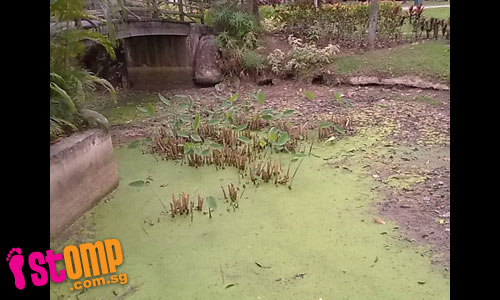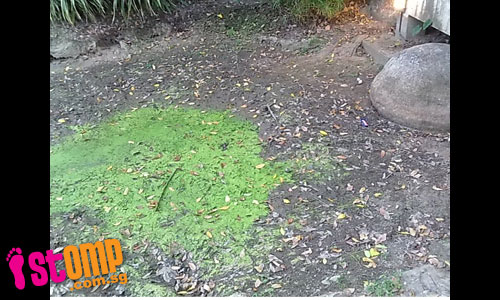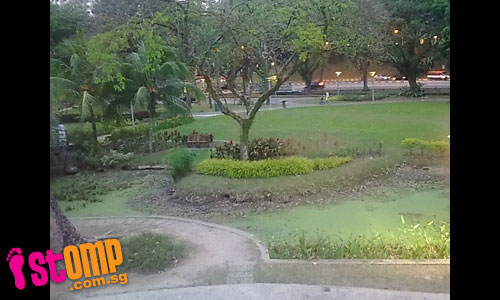
The recent dry spell and hot weather has left this pond at Tiong Bahru park completely dried up, observes Jogger@TBP. He says:
"This pond located at Tiong Bahru Park has dried up, killing the living organisms in it.
"As a frequent jogger and animal lover, it greatly pains me to see the pond in such a condition.
"Can't National Parks and Tanjong Pagar Town Council do something about this?"




Related posts: Scorching sun turns Singapore from 'green' city into gold (3rd March 2010)
Related articles: Fry Days (7th March 2010) (Mirror)
Sorry kid, it's going to stay hot and dry for a while (2nd March 2010) (Mirror)
Last month the driest Feb in 140 years (1st March 2010) (Mirror)
February 2010 is driest month for Singapore since records began in 1869 (2010) (Mirror)
Driest February ever recorded to date in Singapore (25th February 2010) (Mirror)
February's a dry, hot season in Singapore (19th February 2010) (Mirror)
I guess the fishes are pretty much screwed, but other aquatic animals are able to leave the pond in search of other ponds; whether they survive long enough to find another refuge is a different matter altogether. Birds, reptiles and flying insects should probably do quite well unless the drought becomes really severe, while frogs and snails might be more limited in terms of the distances they can travel.
Many other organisms, including insects, snails, and worms, are able to burrow into the mud and go into aestivation, where they lay dormant and await the arrival of rain. For other species, most or all may perish, but the species may still survive in the form of eggs, seeds, and underground roots and stems, also laying dormant until the water returns.
In fact, maybe not all the fish are doomed; many species of fish are able to survive the drying up of their ponds. By burrowing into the mud and laying dormant, many species are able to survive in this manner for some time.
The African lungfish (Protopterus sp.) are especially famous for such behaviour, while locally, species such as the common walking catfish (Clarias batrachus), swamp eel (Monopterus albus) and climbing perch (Anabas testudineus) are able to do the same, albeit to a more limited degree. These species are more famous for being able to leave the water and survive for some time on land, as they search for more hospitable bodies of water. While such behaviour may doom them if this drying pond is the only suitable habitat around, it could save their lives if they manage to survive traffic, pedestrians, predators such as dog, cats, and birds, and find a replacement canal or pond to their liking.